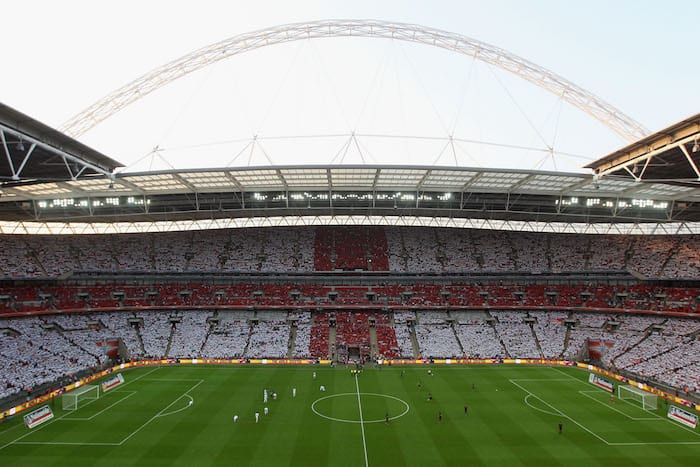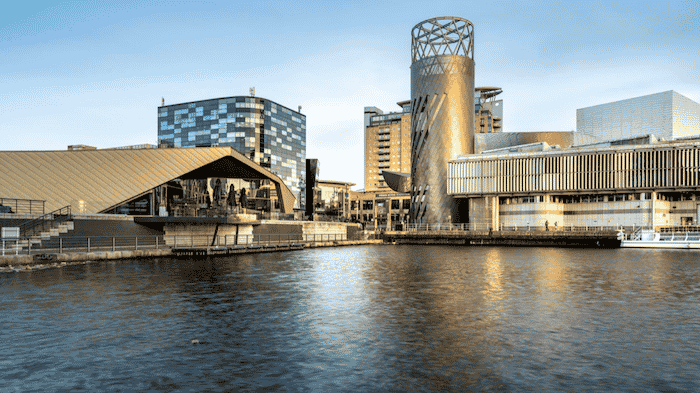The great untold story of how Manchester was cheated out of the new national stadium
- Written by Ray King
- Last updated 7 years ago
- Sport

English football would not lose its “soul” if Wembley Stadium is sold, according to Football Association chairman Greg Clarke.
Well, he would say that, wouldn’t he, when there’s a possible £900 million deal at stake if the sale of the stadium to American billionaire Shahid Khan goes through.
But, according to Labour MP and former leader of Manchester city council Graham Stringer, English football – in the guise of its ruling body, the FA – sold its soul years ago. And at Manchester’s expense.
Mr Stringer, MP for Blackley and Broughton, who led the council from 1984 to 1996, accuses the FA of contemplating “the final betrayal”.
The MP’s anger with the FA goes back to the mid-1990s when the imminent closure of the old, clapped out Wembley Stadium sparked a contest among several cities – Birmingham, Sheffield, Bradford, London and Manchester – to build a new, national stadium.
The winner was set to take all – £100 million of Lottery funding from the Sports Council (now Sport England).
From the outset, Manchester was in pole position. The centrepiece of the city’s bid to stage the 2002 Olympic Games had been a futuristic 80,000 seat all-sports stadium that had been much admired by the International Olympic Committee. The decision to award the games to Sydney was announced in Monte Carlo 1993. Manchester went after the Commonwealth Games instead.
“When the national stadium issue arose, we had a cleared site with planning permission and a ready prepared, much admired stadium design and the Commonwealth Games on the way. We thought our bid was unbeatable,” says Mr Stringer.
Wembley, by contrast, did not have a prepared design and there were issues over the stadium’s ownership. The Sports Council, the FA and the ruling bodies of Rugby Union, Rugby League and athletics would judge the bids.
But on October 30th, 1995, the day the Sports Council had been expected to name the winning bid, they announced instead that the contest had been narrowed down to Wembley or Manchester and that a further three-to-six months of deliberation would be needed.
Sports Council chairman, Rodney Walker, said at the time: “This is a decision for the next 60 years. It is a decision about how to spend tens of millions of Lottery funding and we must be sure that public money is spent wisely.
“We have deliberated long and hard. But now that Manchester and Wembley realise they are in a very serious bid situation it will be possible to start tough negotiations which we couldn’t do before.”
The delay was to be a lot longer than six months. Suspicion grew in Manchester that the so-called contest had been a sham and the hiatus was designed to allow Wembley to get its act together.
Then, in 1999, one of the supposed “judges” – the FA – bought Wembley Stadium. Game over.
“The FA behaved like absolute shits,” raged Mr Stringer. “They were prejudiced from the start.
“They wanted to keep control of the fixture lists, FA Cup finals and semi finals and all England international matches as a monopoly to use as a supply of freebies for themselves and their cronies. That’s putting it at its most cynical, but there’s a significant base of the establishment ready to buy into that. It’s the great untold story.”
Most accounts of what became the long drawn out national scandal over Wembley – the FA being allowed to renege on the original equipment for all-sports stadium including a running track; its out-of-control budget running to £750 million and failure to meet construction deadlines – begin in 1999.
In fact, this unsavoury saga began four years earlier and the way Manchester and sports fans throughout the country were cheated has been airbrushed from history.
Mr Stringer said: “We had our 80,000-seat proposal costed at £150 million. Even if it had run over budget – which the smaller Commonwealth Games version did not – it would still have been only a fraction of the cost of Wembley.”
It is understood that Mr Khan – who also owns Championship team Fulham and American NFL gridiron football side Jacksonville Jaguars – would pay £600m for Wembley Stadium and the FA will continue to run the Club Wembley hospitality business, valued at £300m.
The FA chairman says Mr Khan’s bid has arisen from the Jaguars’ annual use of the stadium since 2013 and their “positive experiences of playing at Wembley.”
Despite Mr Stringer’s criticism of the FA’s conduct, he sees a sale of Wembley as a possible opportunity to end the “outrage” of teams based in the north of England and their fans being forced to travel to London for FA Cup semi-final matches which used to be played at neutral grounds convenient to both.
He said: “I think there’s a case for the play-offs to continue at Wembley – its a day out for fans of clubs never likely to play at the national stadium in the normal course of events. But ripping off northern supporters following their teams in cup semi-finals is an outrage.
“Perhaps selling the stadium to Mr Khan will enable the Wembley’s monopoly on England International matches to be broken as well.”
- This article was last updated 7 years ago.
- It was first published on 26 May 2018 and is subject to be updated from time to time. Please refresh or return to see the latest version.
Did we miss something? Let us know: press@ilovemanchester.com
Want to be the first to receive all the latest news stories, what’s on and events from the heart of Manchester? Sign up here.
Manchester is a successful city, but many people suffer. I Love Manchester helps raise awareness and funds to help improve the lives and prospects of people across Greater Manchester – and we can’t do it without your help. So please support us with what you can so we can continue to spread the love. Thank you in advance!
An email you’ll love. Subscribe to our newsletter to get the latest news stories delivered direct to your inbox.
Got a story worth sharing?
What’s the story? We are all ears when it comes to positive news and inspiring stories. You can send story ideas to press@ilovemanchester.com
While we can’t guarantee to publish everything, we will always consider any enquiry or idea that promotes:
- Independent new openings
- Human interest
- Not-for-profit organisations
- Community Interest Companies (CiCs) and projects
- Charities and charitable initiatives
- Affordability and offers saving people over 20%
For anything else, don’t hesitate to get in touch with us about advertorials (from £350+VAT) and advertising opportunities: advertise@ilovemanchester.com

Frankie Lipman steps into Lady Macbeth’s shoes in gutsy new take on Shakespeare

Zeus gets a Salford makeover in this electrifying new play celebrating young creatives


Best bars and pubs to watch the football and live sport in Manchester

Discotheque Royale vs Piccadilly 21s: which was your favourite 90s Manchester club?
















